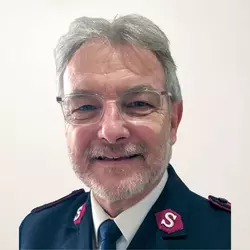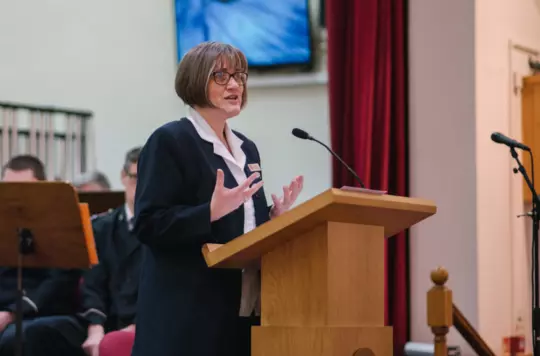9 October 2024
A priesthood of all believers
Major David Taylor

Major David Taylor reflects on the theology of officership and spiritual leadership.
The assumptions and expectations of contemporary life have changed dramatically in The Salvation Army’s 159 years. How do we understand officership and spiritual leadership to serve the present age in the UK and Ireland?
A royal priesthood
The good news is that God still chooses and enables ordinary human beings to participate in God’s mission of salvation for the world. Through
the incarnational life, death and resurrection of Jesus, every Christian disciple is liberated to be a partner in God’s mission, bearing witness in their words and deeds.
Peter called the people of God ‘a royal priesthood’ (1 Peter 2:9), inspiring the familiar saying that God’s people are a ‘priesthood of all believers’. This does not mean that every individual is a priest but that, all together, the people of God the Father – the body of Christ (see 1 Corinthians 12:27), the temple of the Holy Spirit (see 1 Corinthians 3:16) – are enabled to mediate his grace to the world. Therefore, every disciple is on a mission and in ministry through God’s grace.
Servant leaders
Paul described God’s people as a spiritually gifted community (see 1 Corinthians 12), literally ‘grace-marked’ (charismata) to serve God’s mission through the Spirit’s presence and grace gifts in their lives. In serving with the grace gifts that God freely supplies, every Christian is enabled to give a lead.
But the early Church recognised the value of appointed servant leaders to ensure two critical things were maintained: first, that every believer is released into the rich diversity of Holy Spirit-inspired giftedness in Christian ministry and mission; and second, that this glorious diversity is held together in an essential unity of one God, Father, Son and Spirit.
These appointed servant leaders were called elders or overseers. They were expected to be mature, wise and faithful examples to the flock. Paul wrote to Timothy that ‘whoever aspires to be an overseer desires a noble task’ (1 Timothy 3:1). Alongside elders, deacons were appointed to serve locally in developing patterns of spiritual leadership and ministry.
This does not represent an exact and legalistic blueprint, but it does indicate how spiritual leaders and ministers emerged within the priesthood of all believers: to release it into diverse and creative ministry as a royal priesthood, while held together in unity.
The overseer serves the unity and diversity of God’s people, in ever widening circles.
Officers
In The Salvation Army, these overseers and servant leaders are officers – called, assessed, trained, ordained and commissioned. The word ‘ordained’ comes from the Latin word ordinare, which literally means to ‘set in order’. Officers are ‘office holders’ upholding the ‘noble task’ of overseeing – locally, regionally, nationally, internationally.
They must help to mobilise the saints, releasing God’s priesthood of all believers into spiritually gifted ministry and mission, while seeking to help God’s people to live in good order and unity, protecting them as far as possible from fracture and division.
This requires that officers are biblically and theologically trained, able to teach and preach the truths of the gospel, that they are good pastors of the flock and able to prophetically listen to and communicate God’s priorities.
In Ephesians, we find the fivefold gifting of the Church: ‘the apostles, the prophets, the evangelists, the pastors and teachers, to equip his people for works of service’ (Ephesians 4:11 and 12).

However, an officer exercising evangelism, for example, does not discount all Christians from being witnesses, or prophecy discount all from hearing from God, or pastoring discount all from caring for God’s people.
Therefore, while officers are well served in being able to use these five gifts to varying degrees, there is no suggestion that they hold them all.
Officership is as much about who a person is as what they do. All disciples gain an incredible identity in Christ that they are invited to grow into. This is equally true for an officer in view of their training, their spiritual formation and their experience.
They are more than the sum of their functions. It is the combination of these that, alongside the Holy Spirit’s work, imbue them with a measure of spiritual authority. This is not automatic and requires full cooperation and humility before God.
Different forms of leadership
The time, energy and sacrifice invested in an officer’s servant leadership should build character, wisdom, experience and trust, but this is not true for officers alone.
It is not difficult to see how, under the guidance of the Holy Spirit, God’s Church – in all its many and diverse expressions, denominations and streams – continues to develop a variety of patterns of leadership, to ensure that every follower of Christ is released into mission and ministry, and that every Christian community is held together in local, regional, national and international unity – and as far as possible held together across ecumenical relationships as the one true Church of Jesus Christ, ‘so that the world may believe’ (John 17:21).
The Salvation Army has through the years sought to employ and deploy God’s people in many different patterns of ministry and leadership, as soldiers, local officers, officers, auxiliary-captains, envoys, warranted leaders and more. In 2000, the International Commission on Officership recognised this vital task.
The International Commission was clear that ‘without dedicated, motivated and qualified officers who are willing to give sacrificial service the effectiveness of mission would be seriously disadvantaged’. It also challenged the Army to go on developing ‘new models of spiritual leadership’ in every context and culture.
God’s mission, not ours
The Salvation Army’s task today is to discern and obediently honour and serve God’s mission, not its own. Discernment involves carefully listening to God, watching to see what God is doing and how God is calling and inspiring people, keeping alert to the Spirit’s ever new and creative lead.
The role of sacrificially dedicated officership, as a service of oversight to the Christian community is crucial, but it is not exclusive of other patterns and callings within leadership and ministry alongside it.
This remains the good news: that God is imaginatively and creatively enabling people to take their place within the priesthood of all believers, exercising gifts of ministry and spiritual leadership.
All within the passionate, holy love, doctrinal clarity, orderly regulation, missional enterprise and evangelistic zeal that Salvationists humbly offer to God as their understanding of how to honour God’s mission in the world.
Written by

Major David Taylor
Divisional Commander, North West and Isle of Man
Discover more

A lifelong commitment to Salvation Army leadership that's taken after deep thought and prayer.

A prayerful commitment to serve as a Salvation Army leader for a minimum of three years.

Opportunities may be advertised for employed corps leaders, pioneer leaders or chaplains.

Design for Life (DFL) is a weekend retreat at William Booth College to help you discover God's design for your life.